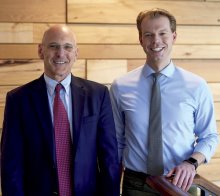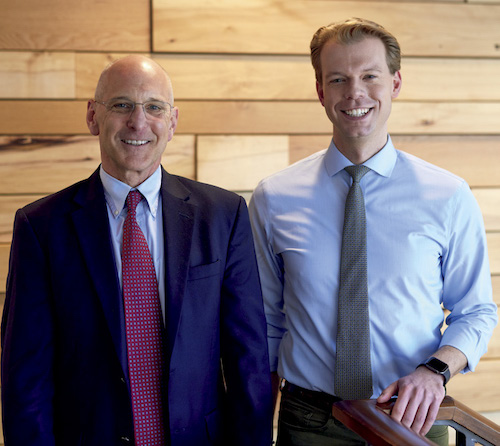
Advanced Research & Study in the Upper School
By Dr. Chris Winters, Head of Upper School, and Dr. Andrew Ruoss, Upper School Academic Dean
As students and families navigate our diverse and rigorous Academic Program, we’re frequently asked why we don’t offer Advanced Placement (AP) courses at GCDS. APs offer a widely recognized standard of rigor—the AP Exam. Most AP exams, however, require teachers and students to sprint through a highly prescriptive curriculum that focuses primarily on content volume and a vast amount of memorization. To be sure, content mastery is a crucial skill and over their four years in the Upper School, GCDS students will dedicate significant time to memorizing the subject area content needed to solve complex, real-world problems. Having taught and served as leaders in nationally recognized high school AP programs, we know first-hand that the AP alone offers little room for higher order thinking and deep understanding of content, for the construction and long-term retention of knowledge, or for the interdisciplinary connections that make learning meaningful. In other words, the AP lacks the skill training for the application of knowledge.
APPLICATION OF KNOWLEDGE
For Upper School students, application is not just an add-on. It is crucial preparation for university study and for the adult world. It represents more challenging work, more complex conceptualization, and the need to develop a process for testing and revision missing from a purely traditional AP curriculum. In order to design and teach our curriculum, for the Upper School faculty, we recruited teachers with expertise in their subject areas, as well as in applied learning—from the university world, from industry, and from other leading independent schools across the country.
“Step on any university campus, the newest, most expensive, and busiest building will be the Center for Applied Studies,” says Gordie Campbell, Head of the Creative Applied Technologies and Computer Science programs. “We train our students in application so that they can take advantage of those cutting edge opportunities day one.”
Whether in English 10, Physics, or Graphic Design, our faculty craft lessons through which students are trained to channel their learning into application. As students engage with our Honors program, they pursue opportunities that pose additional challenges in both subject skills and in application.
Every academic department also now offers Advanced Applied courses. These courses extend far beyond the AP standards, requiring significant content and skill mastery, along with strong application and independent research.
COLLEGE & UNIVERSITY TRENDS
Building a faculty of experienced teachers with significant academic and professional expertise allows us to offer a dynamic and unique academic program. It also enables us to base our academic program on exhaustive and continuous research. This includes tracking the nuanced and evolving narrative around APs. Over the past decade, many of the most competitive colleges and universities have stopped accepting AP credits altogether, and leading independent schools across the country have moved away from the AP curriculum.
Drawing from his experience in independent schools, as well as in the Princeton University and Bowdoin College admissions offices, Director of College Counseling Andy Ramirez adds, “At no point has a school’s move away from the AP adversely affected students’ admissions prospects to the most selective colleges in the country.” In fact, according to Ramirez, “Our four years of admissions results show that our signature experiences in application-based learning, including the Junior Thesis, Advanced Applied Courses, and Independent Studies, provide our students with significant advantages in the college process.”
Our Academic Office works closely with College Counseling to monitor trends and policies at the college level, and to guide our academic program to maintain students’ advantages in the college process. For example, with the dissolution of the SAT II subject tests, many university engineering programs, which long used the SAT II as an admissions requirement, have turned to the AP as a temporary replacement. Our STEM faculty adjusted our program in anticipation of this shift.
While our Math department does not formally offer the AP, for example, Honors Calculus teacher Annette Iversen has created a pathway for students seeking to pursue admission to the most competitive engineering programs: “Starting in Honors Pre-Calculus, we work with students to identify those who can manage mastery of the content requirements for AP, while also continuing to develop their applied problem solving skills.”
Her students thus pursue a course of study that can be validated by the AP (the average score for her courses is currently a 5), but Iversen also ensures that they gain the advanced training in application that distinguishes our program.
RIGOROUS & REWARDING PREPARATION
The strength and experience of our faculty ensure that the school’s program can pivot and evolve to continue to provide a challenging and engaging academic program, while effectively preparing our students for the next steps in their education, and ultimately, to make an impact in the field of their choosing.
Soon Wiley, Head of the Upper School English Department and a published novelist, teaches the popular Advanced Applied Creative Writing course: “Teaching at GCDS means that I can offer my students a rigorous and rewarding experience without sacrificing classroom time for test prep. As an educator, there’s no greater reward than knowing you have the curricular freedom to equip your students with the skills that they will need if they want to continue pursuing this field beyond our campus.”
Paula Russo, a former practicing attorney and law school dean, joined the GCDS faculty for the opportunity to infuse Upper School students’ foundational learning in the social sciences with experiences decoding real-world problems in law and international relations. According to Russo, “Having the freedom to structure courses to prepare students for what I know they will encounter at the college level—including independent research, and crucially, interdisciplinary problem solving—that’s such an advantage for our students, and a far richer learning environment than prescribed programs can provide.”
MISSION CRITICAL
Looking toward the trends and landscape of colleges and careers, Coleman Hall, Head of our Math Department, agrees: “With our school’s mission to enable each of our students to discover and develop what is finest in themselves, we believe that it is critical to provide authentic, enriching opportunities to explore concepts in both the applied and theoretical way.”
Hall and all of our faculty have channeled their experience and expertise to build an academic program that can continually adapt, prioritize research over ideology, and encourage ambition and innovation over competition and conformity. And in a world where the pace of change only continues to quicken and the complexity of problems continues to deepen, Country Day’s mission has never been more crucial.
#gcdsus #gdcsacademics











.JPG&command_2=resize&height_2=85)





.jpg&command_2=resize&height_2=85)




